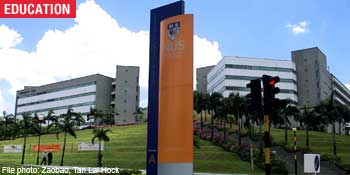 |
|
The National University of Singapore (NUS) is known as one of the best universities in the world, but does an education here come with a hefty price-tag to match?
A 2007 ranking of the world’s top 200 universities by British paper, The Times of London, placed NUS at No.33. This was a tumble from the previous year, where it made No. 19 on the paper’s list of top 20 tertiary institutions in the world.
In this year's Feb 3 issue of Forbes, a list of “The World’s Most Expensive Colleges” ranked NUS as the ninth most expensive college in the world, with an annual tuition fee of $36,000.
A paragraph in the article read: “...a total price tag of more than US$31,000 ($46,751 including living expenses), makes an NUS education one of the most expensive in Asia.”
NUS was ranked alongside other renown overseas colleges such as the University of Melbourne (annual fee $30,463) and Imperial College London ($41,925 for non-British and European Union students) in terms of college fees.
U.S. still remains the priciest place to obtain a university education
The top five places in Forbes’ list belonged to private universities in the US, with each commanding a minimum tuition fee of at least $55,000 to $66,000 per year.
These include D.C.'s George Washington University, with a price of $60,600 for the 2008-2009 school year. Others in the top five are Sarah Lawrence College ($60,500), Kenyon College ($60,300), Vassar college ($60,300) and Bucknell University ($55,000).
Fees at elite Ivy League universities are on the high end as well: University fees for a year at Harvard come up to $54,000, while those at Yale are about $53,000.
This excludes cost of living, books and travelling expenses. Factoring in those amounts, as well as miscellaneous expenses, their fees are comparable to those of private colleges among the top five.
University fees on the increase
Despite the recession, students are not seeing a decrease in university fees.
On the contrary, tuition fees are on the rise. Annual fees for the top five colleges in the US have increased by 4.8% from 2007. Some colleges have even hiked up their fees by up to 7%.
"Not the most expensive"
When contacted by local Chinese paper Lianhe Wanbao, a spokesperson for NUS said they were "honoured" to be on Forbes’ list of best universities in the world, but wished to refute its claim about NUS being one of the most expensive colleges in Asia.
According to the NUS’ spokesperson, all local students are awarded a tuition grant and subsidy by the S'pore government. After the subsidy, most students pay between $6,000 to $8,000.
However, foreign students pay a higher fee, which is about 50 per cent more. The amount ranges between $9,000 to $20,000. Even then, he said, this is much lower than the fees of other top universities.
Foreign students keen to study at NUS are also eligible for financial aid. NUS has a comprehensive subsidy scheme designed to provide financial aid for overseas students. These include, study loans, bursaries and scholarships, he said.
Top 10 World's Most Expensive Colleges
(2008-2009 estimated tuition cost)
| 1. US: George Washington University, Washington D.C | $60,963 (tuition and fees) |
| 2. US: Sarah Lawrence College, New York | $60,851 (tuition and fees) |
| 3. US: Kenyon College, Ohio | $60,685 (tuition and fees) |
| 4. US: Vassar College, New York | $60,640 (tuition and fees) |
| 5. US: Bucknell University, Pennsylvania | $59,799 (tuition and fees) |
| 6. Franklin College, Switzerland | $49,918 (US and Canada) |
| 7. American University of Paris, France | $49,164 |
| 8. Imperial College London, UK | $41,925 (non-resident) |
| 9. National University of Singapore, Singapore | $36,194 (non-resident) |
| 10. University of Melbourne, Australia | $30,463 (non-resident) |
Source :Forbes
No comments:
Post a Comment